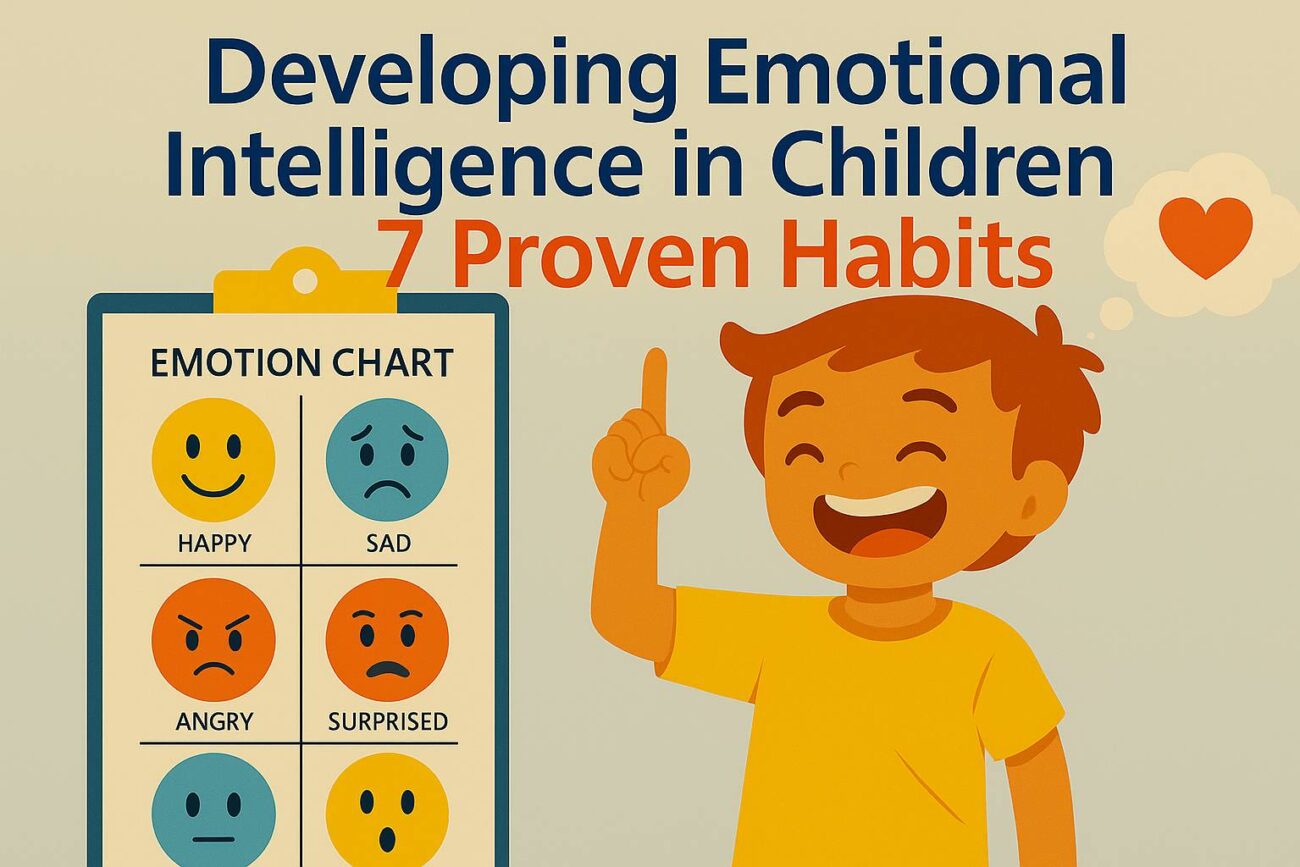Introduction: Why Emotional Intelligence Is the Superpower Kids Really Need
For developing emotional intelligence in children, imagine this: your child is melting down in the middle of the grocery store. Although they may struggle to make friends at school. And sometimes, they say “I’m fine” when clearly, they’re not.
Sound familiar?
In a world that often prioritizes test scores over tenderness, developing emotional intelligence in children has never been more important. As a result, emotional intelligence—or EQ—isn’t just about understanding feelings. It’s about emotional awareness, empathy, problem-solving, self-regulation, and building real human connection.
And here’s the good news: it’s not something kids are born with. In fact, it’s something they learn—with you.
If you’re wondering how to raise emotionally intelligent kids, these 7 simple but powerful parenting habits are a great place to start.
🪴 1. Help Kids Name Their Feelings Early
Most young children feel emotions before they understand them. Therefore, when you give them words for what’s happening inside—like “frustrated,” “excited,” or “worried”—you build the foundation for emotional awareness.
🧩 Try This:
- Use an emotion chart or “feelings thermometer” with visuals.
- Ask questions like, “Are you feeling a little angry or very angry?”
- Model it: “I feel disappointed because I forgot something important.”
✅ Why It Works:
Labeling emotions helps kids express themselves with words, not outbursts—a core part of developing emotional intelligence in children.
💬 2. Be a Role Model for Emotional Regulation
Also, your child learns how to react to stress by watching how you react. When they see you pause, breathe, and respond calmly—even when you’re frustrated—they learn emotional regulation.
🧩 Try This:
- Narrate your own feelings: “I’m feeling overwhelmed, so I’m going to step outside for a minute.”
- Practice deep breathing or grounding exercises together.
- Replace yelling with problem-solving language.
✅ Why It Works:
Children learn self-control by observing it. Furthermore, modeling calm responses helps them manage big emotions more effectively.
📖 3. Make Emotions a Daily Conversation
Talking about feelings shouldn’t be a once-in-a-while thing. In contrast, make it part of your daily rhythm, just like brushing teeth or doing homework.
🧩 Try This:
- Ask at dinner: “What made you feel proud today?” or “What frustrated you?”
- During storytime, ask: “How do you think the character felt?”
- Be curious, not corrective, when your child expresses a tough emotion.
✅ Why It Works:
Consistent conversations about emotions help kids normalize feelings—and build empathy in children.
🧠 4. Let Kids Solve Their Own (Small) Problems
You don’t have to rescue your child from every difficult moment. On the contrary, emotional growth in kids happens when they’re gently challenged and guided, not rescued.
🧩 Try This:
- Instead of offering a solution, ask: “What do you think we could try?”
- Encourage them to brainstorm, even if the first idea isn’t perfect.
- Celebrate effort over outcome: “You kept trying even when it was hard!”
✅ Why It Works:
Letting kids face age-appropriate challenges builds confidence and emotional resilience.
❤️ 5. Nurture Empathy Through Real-Life Moments
Empathy—the ability to understand how someone else feels—is a skill that grows with practice. Not only does it make kids kinder, but it also strengthens their ability to connect.
🧩 Try This:
- Use everyday events: “How do you think your sister felt when you took her toy?”
- Watch shows or read stories and pause to explore the characters’ emotions.
- Praise kind actions: “That was really thoughtful of you to check on your friend.”
✅ Why It Works:
Empathy strengthens relationships and helps kids become emotionally intelligent and socially aware.
🏆 6. Focus on Effort, Not Just Praise
Saying “You’re so smart!” feels good—but can actually cause anxiety and fear of failure. Instead, highlight effort, persistence, and creative thinking.
🧩 Try This:
- Swap “You’re amazing at that!” with “You worked really hard and stayed focused!”
- Normalize failure: “Everyone messes up—it’s how we learn.”
- Reflect on tough situations together: “What could we try next time?”
✅ Why It Works:
Kids who value effort over perfection are more confident and open to emotional growth.
📱 7. Protect Real Connection by Managing Tech
Technology isn’t bad—but it can get in the way of real-life emotional learning. Indeed, eye contact, tone of voice, and body language are skills that can’t be picked up from a screen.
🧩 Try This:
- Set “no device” times (meals, car rides, 30 mins before bed).
- Watch emotional stories together and talk about the characters’ feelings.
- Schedule weekly “talk time” without distractions.
✅ Why It Works:
Face-to-face moments are where kids build trust, learn empathy, and practice emotional communication.
🌟 Conclusion: Raise Kids Who Feel Deeply and Think Clearly
You don’t need to be a parenting expert to raise emotionally intelligent kids.
Instead, start small: Talk about feelings. Model calm. Let your child try—even if they fail. These everyday habits shape how your child relates to themselves and the world around them.
🎯 Your Action Step Today:
Choose just one of the seven habits and practice it with your child this week. Be patient. Be present. And celebrate progress—not perfection.
Because developing emotional intelligence in children is not about raising perfect kids. It’s about raising self-aware, kind, and resilient humans who can thrive in any situation.
Read More About: Fun Mindfulness Activities to Help Kids Focus
How to Recognize ADHD Symptoms in Teenagers
American Psychological Association – EQ and child success
Harvard’s Center on the Developing Child

